-
Category: Environment

The company delivered another year of steady performance in the backdrop of continuing sluggishness in the macro-economic environment, exacerbated by a steep increase in taxes / duties on cigarettes, which led to unprecedented pressure on legal cigarette industry sales volumes. ITC also had to contend with start-up costs relating to the launch of new products and categories in the non-cigarette FMCG segment, input cost pressures in the Paperboards, Paper & Packaging Businesses and a weak demand and pricing environment in the Hotels Business.
Gross Revenue for the year grew by 7.0% to Rs. 49,964.82 crores. Net Revenue at Rs. 36,083.21 crores grew by 9.7% primarily driven by a 11.3% growth in the non-cigarette FMCG segment, 8.1% growth in the Agribusiness segment and 8.7% growth in the Cigarettes segment. Profit Before Tax registered a growth of 10.6% to Rs. 13,997.52 crores while Net Profit at Rs. 9,607.73 crores increased by 9.4%. After adjusting for liability written back in Q2 FY14 (towards Rates and Taxes and Interest thereon pertaining to earlier years, aggregating Rs. 192.68 crores) underlying growth in Profit Before Tax and Net Profit for the year grew by 12.3% and 11.0%, respectively. Earnings Per Share for the year stood at Rs. 12.05 (previous year Rs. 11.09). Cash flows from Operations aggregated Rs. 13,534.65 crores compared to Rs. 10,759.50 crores in the previous year.
ITC, as a premier 'Indian' enterprise, consciously exercises the strategic choice of contributing to and securing the competitiveness of the entire value chain, of which it is a part. This philosophy has shaped the Company's approach to business into 'a commitment beyond the market'. With its diversification initiatives over the past few years, the Company is well positioned to establish itself as the 'most trusted provider of food products in the Indian market' leveraging a strong portfolio of world-class brands, deep understanding of the diverse tastes and preferences of Indian consumers, focus on best-in-class quality and operational excellence across the value chain.
Continuing with its chosen strategy of creating multiple drivers of growth, the Company is presently the leading FMCG marketer in India, the 'greenest luxury hotel chain' in the world, the clear market leader in the Indian Paperboard and Packaging industry and leading exporter of quality Agri products. ITC's wholly owned subsidiary, ITC Infotech India Limited, is poised to achieve its strategic and financial objectives by leveraging its leadership in the knowledge-centric Information Technology services and its increasing global presence.
For the year ended 31st March, 2015, ITC declared a Dividend of Rs. 6.25 per share (previous year Rs. 6.00 per share).
| Crores | ||||||
|---|---|---|---|---|---|---|
| Key Economic Indicators* | 2010-11 | 2011-12 | 2012-13 | 2013-14 | 2014-15 | CAGR |
| Gross Revenue | 30528 | 34872 | 41810 | 46713 | 49965 | 13% |
| Net Revenue | 21168 | 24798 | 29606 | 32883 | 36083 | 14% |
| Exports | 2464 | 2315 | 3474 | 4046 | 4511 | 16% |
| Contribution to Government / Exchequer | 15860 | 18006 | 22343 | 25669 | 26912 | 14% |
| Cost of Bought out Goods and Services | 12374 | 14255 | 17031 | 18391 | 19764 | 12% |
| Employee Benefits Expense | 1140 | 1258 | 1387 | 1608 | 1780 | 12% |
| Payments to Providers of Capital | 4498 | 5669 | 6800 | 7977 | 8645 | 18% |
| - Interest and Dividend | 3512 | 3596 | 4235 | 4775 | 5067 | |
| - Retained Profits | 986 | 2073 | 2565 | 3202 | 3578 | |
* Detailed Financial Performance available at www.itcportal.com
| Crores | ||||||
|---|---|---|---|---|---|---|
| Year | 2010-11 | 2011-12 | 2012-13 | 2013-14 | 2014-15 | CAGR |
| Gross Revenue | 30,528 | 34,872 | 41,810 | 46,713 | 49,965 | 13% |
| PBDIT | 7,993 | 9,674 | 11,566 | 13,562 | 15,017 | 17% |
Despite the extremely challenging business environment during the year under review, ITC continued to make significant investments in the Indian economy across its business domains, even as it has been successful in generating progressively higher returns on the assets deployed. Hence, while the Balance Sheet size of the Company has expanded at a compound rate of 15% over the previous five years to reach Rs. 44,195.66 Crores as at 31st March, 2015, returns on assets deployed have increased from about 29% to about 32% during the same period.
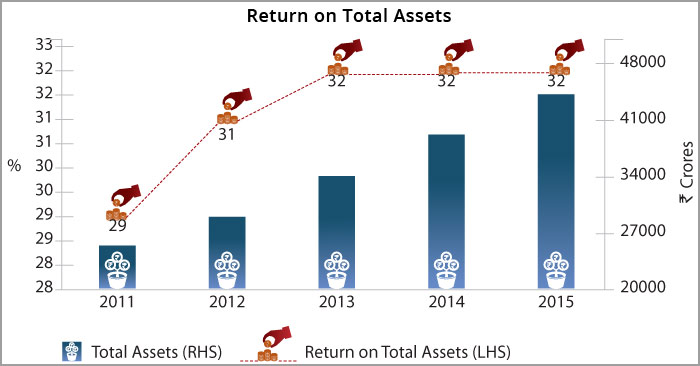
ITC is one of India's most admired and valuable corporations and has consistently featured over the last nineteen years, amongst the top 10 private sector companies in terms of market capitalisation and profits. It is amongst the most influential stocks in the Indian equity market.
| 1996 | 2010 | 2011 | 2012 | 2013 | 2014 | 2015 | CAGR | |
|---|---|---|---|---|---|---|---|---|
| Market Capitalisation ( Crores )* | 5571 | 100476 | 140408 | 177360 | 244245 | 280708 | 260864 | 22% |
| Adjusted EPS ( )** | 0.35 | 5.31 | 6.45 | 7.88 | 9.39 | 11.05 | 11.99 | 20% |
*Market Capitalisation based on year-end closing prices quoted on the Bombay Stock Exchange. **EPS adjusted for impact of Corporate Actions to facilitate like to like comparison.
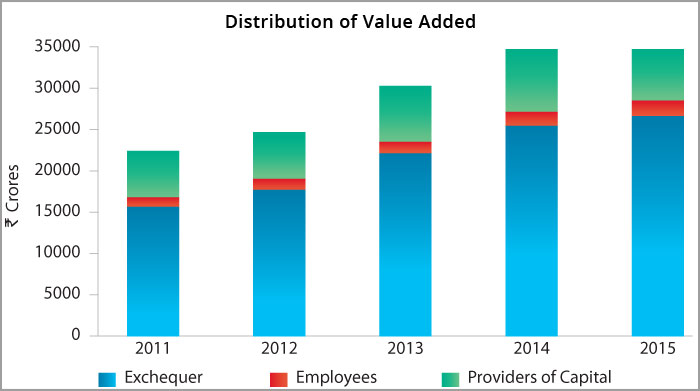
The Company's contribution accounts for about 7.48% of the total excise revenue of the Government of India. In the area of income tax, the Company is the highest tax payer in eastern India and among the top tax payers nationally.
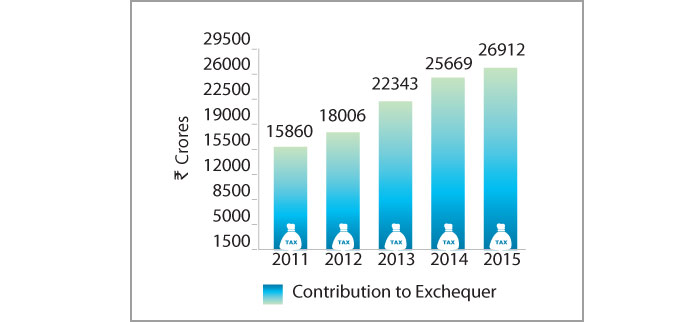
For the current year, the Company has declared a dividend of Rs. 6.25 per share of Rs. 1/- each.
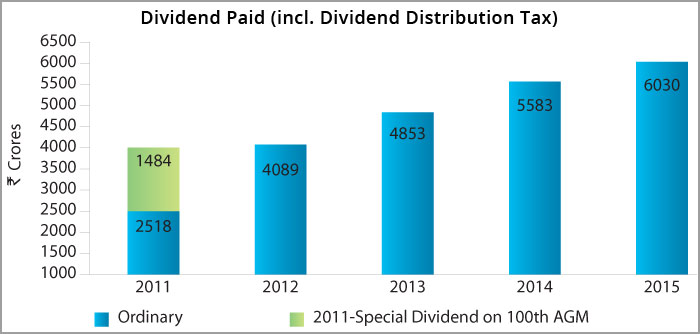
The Company's suppliers, both local and international, constitute one of its important stakeholder groups. Supplier engagements are founded on a positive procurement culture supported by policies, processes and best practices to ensure that procurement activity is conducted in an open, transparent and non-discriminatory manner. Strong processes are in place to identify / develop and qualify vendors on the basis of supply assurance, innovation quotient, product quality and value for money considerations. Formal competitive processes are established and documented discussions, recommendations and decisions underlay procurement activity.
All businesses of the Company have modern facilities and use state-of-the-art technologies to ensure benchmarked quality and value. Accordingly, the Company sources specialised production machinery from reputed international and Indian manufacturers - across large, medium and small scale sectors. Utility machinery such as boilers, generator sets, air-conditioning and refrigeration machinery and electrical & electronic systems are sourced largely from Indian or India-based suppliers. Competent Indian contractors carry out construction and renovation of new manufacturing facilities, hotels, warehouses & offices. About 85.8% of raw materials and stores & spares have been locally procured during the year.
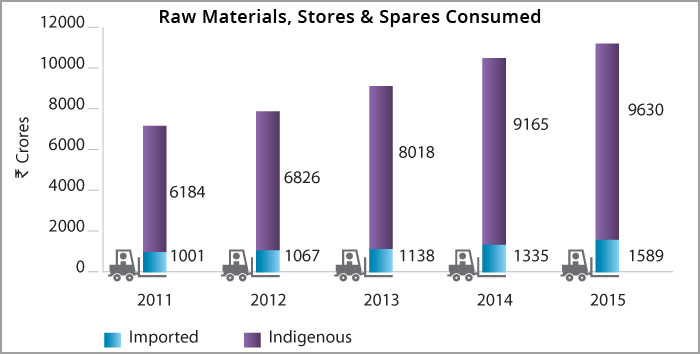
The Company actively encourages competency development among local vendors and its vendor base includes numerous medium and small scale enterprises that are proximate to its manufacturing locations. Wherever appropriate, vendors are provided technical support and managerial inputs to enable them to move in tandem with the Company's business plans. The Company also supports several vocational training initiatives in areas in the vicinity of its operations. These have been effective in empowering youth with requisite skills and increased opportunities for entrepreneurial development. Further, the Company has continued to set up sourcing centres in rural India for several of its product categories, both directly and in collaboration with various State agencies and NGOs to assist in the creation of sustainable livelihoods.
The Company had availed the incentives offered by the States of Andhra Pradesh and Tamil Nadu, by way of deferment of Sales Tax, which are repayable over a period ranging from 10 to 14 years. The outstanding amount of such assistance in the form of Deferred Sales Tax due to be repaid by the Paperboards and Specialty Papers Division (PSPD) is given below:
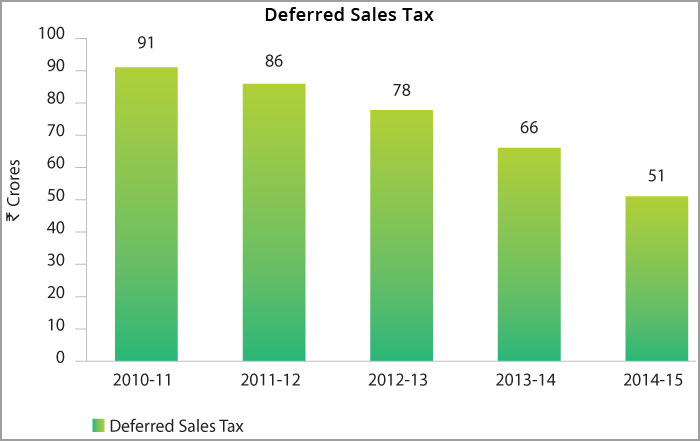
It is the Company's Human Resource (HR) philosophy that while dealing with each other, the management and employees shall uphold the values of trust, teamwork, mutuality and collaboration, meritocracy, objectivity, self-respect and human dignity. ITC's HR management systems and processes are relentlessly customer-focused, competition-differentiated, performance-driven and future-capable. The Company's HR Development strategy seeks to fulfil this mandate through careful selection and rigorous implementation of a wide range of programmes and interventions.
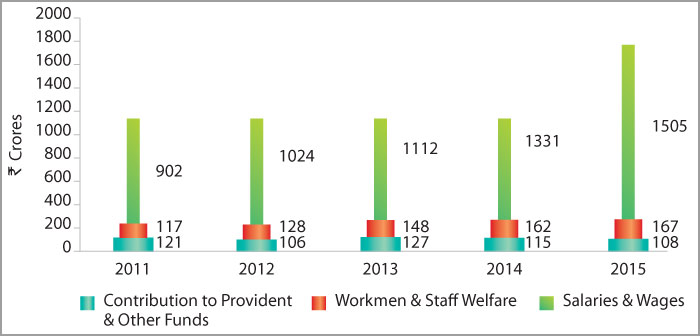
ITC believes that its competitive capability to build future-ready businesses and create enduring value for stakeholders is enriched by a dedicated and high-quality human resource pool. Therefore, nurturing quality talent and caring for the well-being of employees form an integral part of ITC's work culture, which focuses on creating a conducive work environment that helps deliver winning performance.
The Company's policy on "Diversity and Equal Opportunity" is premised on its fundamental belief that diversity at the workplace creates an environment conducive to engagement, alignment, innovation and high performance. The Policy provides for diversity and equal opportunities to all employees across the Company, based on merit and ability. The policy also ensures a work environment that is free from any form of discrimination amongst its employees in compensation, training and employee benefits, based on caste, religion, disability, gender, sexual orientation, race, colour, ancestry, marital status or affiliation with a political, religious or union organisation or majority/minority group. A necessary structure for dealing with requirements like sexual harassment has been put in place.
The Company's talent management strategy is focused on building a future-ready talent bank in the organisation to ensure a pipeline of high-quality managerial talent, specialists and business leaders. ITC's talent engagement approach focuses on attracting and nurturing quality talent, supported by significant investments in learning and development.
In 2014-15, the minimum wage paid to entry level workers of the Company was equal to or more than the statutory minimum wage applicable at all locations of ITC's operations. The employees are also entitled to retirement benefit schemes which include employee pension, provident fund and gratuity. All statutory payments, as applicable, e.g., Provident Fund and Family Pension contributions, are deposited with the Government in a timely manner.
The pension plans and other applicable employee benefits obligations are determined and funded in accordance with independent actuarial valuation. The assets of these trust funds are managed in accordance with the prescribed statutory pattern. The assets of the trust funds are well diversified and investments are made with the objective of protecting capital and optimising returns within acceptable risk parameters. The funds are consistently sustained to meet requisite superannuation commitments.
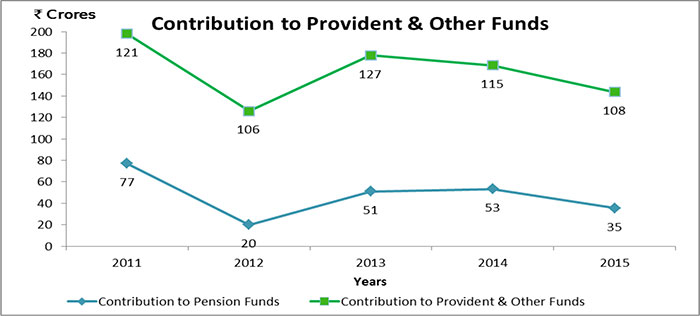
ITC's overarching aspiration to create significant and sustainable societal value, inspired by a vision to subserve a larger national purpose and abide by the strong value of trusteeship, is manifest in ITC's CSR initiatives that embrace the most disadvantaged sections of society, especially in rural India, through economic empowerment based on grassroots capacity building. Towards this end, the Company adopted a comprehensive CSR policy in 2014-15 conceived to address the major development challenges being faced by the nation.
In the social sector, the two most important stakeholders for the Company are (a) rural communities in the Company's agri-business areas who look at ITC to find viable solutions to some of the major challenges that could threaten the sustainability of their production systems and (b) communities residing in close proximity of the Company's production units, situated in urban and semi-rural locations, who expect help in the creation of the necessary socio-economic infrastructure for the development of a healthy, educated and skilled work force with the capability to successfully compete for modern jobs.
It is in pursuance of these goals that the Company has drafted its policy on Corporate Social Responsibility (ITC's CSR Policy detailed in the Policies & Guidelines section of this Report and in the section on Report of the Directors & Management Discussion and Analysis in the Annual Report and Accounts 2015). Given ITC's operational spread, its stakeholder representation cuts across rural and urban milieus. Interventions therefore are appropriately designed to respond to their unique multi-dimensional development challenges in order to accomplish the goal of empowering stakeholder communities to promote sustainable livelihoods.
Various CSR activities in which the Company has been engaged during the current year are listed below:
| Areas listed under Schedule - VII to the Companies Act, 2013 | ITC's interventions (including through Trusts established by the Company) |
|---|---|
| (i) Eradicating hunger, poverty and malnutrition, promoting health care including preventive health care and sanitation including contribution to the Swachh Bharat Kosh setup by the Central Government for the promotion of sanitation and making available safe drinking water. | Health & sanitation, drinking water, contribution to Swachh Bharat Kosh |
| (ii) Promoting education, including special education and employment enhancing vocation skills specially among children, women, elderly, and the differently abled and livelihood enhancement projects. | Education, vocational training, livestock development and livelihoods generation |
| (iii) Promoting gender equality, empowering women, setting up homes and hostels for women and orphans; setting up old age homes, day care centres and such other facilities for senior citizens and measures for reducing inequalities faced by socially and economically backward groups. | Women empowerment |
| (iv) Ensuring environmental sustainability, ecological balance, protection of flora and fauna, animal welfare, agroforestry, conservation of natural resources and maintaining quality of soil, air and water including contribution to the Clean Ganga Fund setup by the Central Government for rejuvenation of river Ganga. | Environmental sustainability soil & moisture conservation and wasteland development |
| (v) Protection of national heritage, art and culture, including restoration of buildings and sites of historical importance and works of art, setting up public libraries, promotion and development of traditional arts and handicrafts. | Protection of national heritage, art and culture |
| (vi) Training to promote rural sports, nationally recognised sports, paralympic sports and Olympic sports. | Sports |
| (vii) Contribution to the Prime Minister's National Relief Fund or any other fund set up by the Central Government for socio-economic development and relief and welfare of the schedule castes, the scheduled tribes, other backward classes, minorities and women. | Contribution to the Prime Minister's National Relief Fund |
| (viii) Rural Development projects. | Agri development |
The expenditure incurred under Section 135 of the Companies Act, 2013 applicable for the first time in 2014-15 on CSR activities amounted to Rs. 214.06 Crores comprising employee benefits expense of Rs. 7.61 Crores and other expenses of Rs. 206.45 Crores of which Rs. 12.67 Crores is accrued for payment as on 31st March 2015. Such CSR expenditure of Rs. 214.06 Crores excludes Rs. 4.97 Crores being the excess of expenditure of salaries of CSR personnel and administrative expenses over the limit imposed of 5% of total CSR expenditure laid down under Rule 4(6) of the Companies (Corporate Social Responsibility Policy) Rules, 2014 for such expenses.


